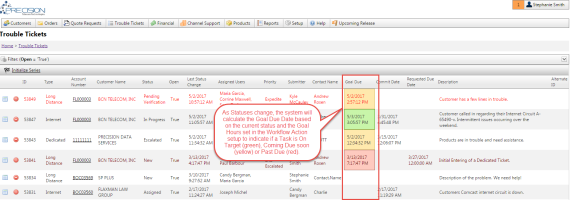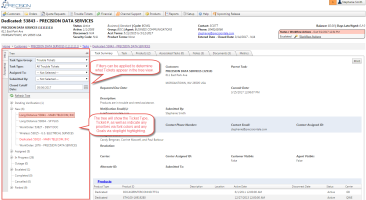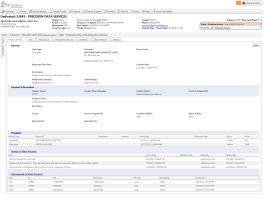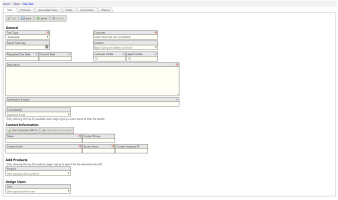Task Tickets Overview
| How do I get here? |
Trouble Tickets Menu ► Inventory |
| Purpose |
Trouble Tickets are designed to track Work Orders and Product trouble tickets in TBS. Since Trouble Tickets in TBS are built using the Task Management module, Clients can customize the types of Tickets in their TBS system to fit their needs. Ticket Types can be setup using the Task Type maintenance tool. For each Type, Clients can also configure the following options for each Task.
|
| Security | Task Tickets Module |
| Taxing Impact | N/A |
| Commission Impact | N/A |
| Data Field Definitions | View Here |
Ticket Inventory View
All Tickets in the system can be found via the Inventory option from the Trouble Tickets Menu. The inventory view will default to show all Open tickets. The inventory grid will provide links to the Ticket as well as to the customer account the ticket is tied to. Font colors will also indicate priority levels for Tickets if they have been configured. This view will also utilize stop light colors if Goal/SLA hours have been setup for the Ticket status group.
Tree View
The Tree View is available from the Trouble Tickets menu as well as when reviewing a Ticket. The Tree view will default to the Tickets Task Type Group and show all Ticket types setup in the system. If the user is allowed to be assigned to a ticket, the Assigned To filter will automatically be set to their username. This can be changed if desired. The Tree view will show all Tickets grouped by Status. Users can expand and collapse each status using the + and - icons. Note: Closed tickets will only appear that are within the window of the Closed Cutoff Date. The Tree Pane also supports a mini-Inventory view that will show a List View of Tickets that match the filter settings.
Once a Ticket is selected from the mini-Inventory view or the tree view, the Ticket information will appear in the right pane of the screen. The Tree view can be "pinned" to remain open or be collapsed to help save working space.
Task Summary
When loading existing Tickets, the user will land on the Task Summary screen. This summary tab will show a snapshot of the entire Ticket as well as the Products attached to the Ticket, the last 5 Notes tied to the Ticket and the last 5 Documents tied to the Ticket each with a link to the specific tab or item for review.
Task Details
The Task Details tab allows new tasks to be added and existing task details to be edited or deleted. Smart lookups are used for Location, Product and Assign Users allowing clients to start typing in the dropdown and have the options filter down based on the entered text. Contact Info can be automatically pulled in from the Accounts Bill To Location or the Selected Location to help speed data entry. On initial entry, some additional fields for Resolution, carrier, etc. are not shown. These fields become available after saving the record. Additionally, the product quick add is only available on initial entry. After the record is saved, products can be viewed from the Products tab.See Field Definitions below for more information.
Associated Tasks
Clients can associate other Task Tickets to one another if they are related. The Associated Tasks tab will provide quick access to any Tickets that have been associated with the main Ticket. This is useful if a Ticket is touching multiple products and those each need different workflows or assignees to help resolve that particular piece of the Ticket.
Locations
Clients can optionally associate Locations to each Task Ticket. One or more location can be associated to the ticket if desired. The Location smart lookup will show all locations tied to the Account the Ticket is tied to and even allow direct entry of a new Location if desired. Based on the Locations, users can then select Contact information from the Location and have it autofill on the Task Ticket if desired.
Documents
Clients can tie one or more documents to a Task Ticket via the Documents tab. These documents will then also be available at the top Customer level as well as on the individual Task Ticket.
Products
One or more products can be tied to the Task Ticket. On Add a quick product picker will be available to add one or more products on the account. Once the Ticket is saved, these products can be viewed via the Products tab within the Task Ticket. From this tab additional products may be added or removed from the Ticket.
Metrics
The TBS system tracks all changes that occur on the Ticket and reports them on the Metrics Tab. Within the ticket, the Metrics tab will show all field level changes, old values, new values, the userID who made the change and the date. This same information flows up to the Customer level metrics as well.
| Field Name | Description | Notes |
| ID | Unique ID assigned to the trouble ticket - these are auto-generated by the system. | |
| Account # | Customer Account number - auto-filled when adding a new ticket | |
| Customer Email | Customer Email address - auto-filled when adding a new ticket | |
| Main Phone | Customer Main Phone - auto-filled when adding a new ticket | |
| Billing Email | Customer Billing Email address - auto-filled when adding a new ticket | |
| Contact Phone | Customer Contact Phone - auto-filled when adding a new ticket | |
| Entry Date | Entered Date of the new ticket - auto-generated when adding a new ticket. Cannot be altered. | |
| Customer | Customer Name - auto-filled when adding a new ticket | |
| Customer Assigned ID | Client chosen assigned ID to provide to the customer | |
|
Status |
Status of the Trouble Ticket which appears as a result of the Action chosen from the Action drop-down list | Maintained using the Status Action System Administration tool |
|
Action |
Actions available to perform on the Customer based upon the Status Action work flow and the current status of the customer. | Maintained using the Status Action System Administration tool |
| Assigned To | Drop down list of TBS Users that can work on Trouble Tickets | This list is populated based on the "Can work on Trouble Tickets" check box on the TBS User record. |
| Type | Drop down list of options that describe the ticket type in more detail. | The options can be maintained by choosing Drop Down Menus from System Administration.
Note: Each Trouble Ticket Type has their own list.
|
| Open Date/Time | Should be used as the Open/Date and time the ticket begins to be worked either internally or with an external party (i.e., Carrier). | |
| Close Date/Time | Date the ticket is closed. Should be filled by the client once the ticket is resolved. | |
| Service Type | Type of service having issues | The options can be maintained by choosing Drop Down Menus from System Administration.
|
| Site Contact | Contact name of the POC for this particular ticket | |
| Email address of the POC for this particular ticket | ||
| Callback Date/Time | Call back date and time to the client. Corresponds with the "Add Calendar Appointment" | |
| Add Calendar Appointment | Works with MS Outlook only. Will add a calendar item to the local MS Outlook calendar corresponding to the Callback Date/Time | |
| Products in Trouble | List of all products on the customer's account. | |
| Circuit IDs in trouble | Textbox to list any circuit IDs involved with the trouble ticket | |
| Submitted to Center | Drop down list of "Centers" that the ticket may be submitted to. This is purely informational and usually corresponds to External support that may have been notified of the ticket for help in resolution. | The options can be maintained by choosing Drop Down Menus from System Administration.
|
| Carrier | Drop down list of all Carriers available for selection corresponding to the product(s) in trouble | The options can be maintained by choosingProvisioning ► Carriers from System Administration. |
| Carrier Ticket Number | Ticket number assigned by the Carrier for tracking purposes in TBS. Informational only. | |
| Description | Main description of the issue | |
| Resolution | Resolution details once the ticket is resolved. | |
| Short Resolution | Drop down list of resolutions. Supports easier data entry if standard resolutions are common and self explanatory. More details can be provided in the Resolution text area is desired. | The options can be maintained by choosing Drop Down Menus from System Administration.
|
| Physical Locations | Drop down list of Physical Locations (from the Facilities module). | This list does NOT include regular locations found under the Account Settings tab. Only locations that are setup within the Facilities module appear in this list. |
| Priority | Drop down of client determined priority levels | The options can be maintained by choosing Drop Down Menus from System Administration.
|
| Facility Type | Drop down of options for designating Facility Type. | The options can be maintained by choosing Drop Down Menus from System Administration.
|
| Resolved By | Drop down of options for designating the party who resolved the ticket. | The options can be maintained by choosing Drop Down Menus from System Administration.
|
| Router Type | Type of routing equipment | |
| ISP | Internet Service Provider | |
| Long Distance Test Info (#1, #2, #3) | Test Call information for long distance issues. Provides areas to capture the type of call, from, to, Call time, message and results from traditional carriers. | |
| Repair/Dispatch Info - Contact Date | Date Repair was contacted. | |
| Repair/Dispatch Info - Access Hours | Repair hours of operation for correspondence | |
| Repair/Dispatch Info - Repair Rep | Repair Rep name assigned to the ticket | |
| Repair/Dispatch Info - Test Results | Repair test results | |
| Repair/Dispatch Info - Dispatch | Repair Dispatch | |
| Repair/Dispatch Info - Commit Date/Time | Repair commitment date for resolution / answer. | |
| Escalation Level | Completely informational and defined by the client. Can be used in Reporting. Determines the level of escalation for the trouble ticket |
Multiple Escalation entries can be added. Levels are completely based on client data entry. Can be used in reporting |
| Escalation To | Corresponds to the Escalation Level and Date. Text box allowing a name to be entered for tracking purposes. | Completely informational - these are not tied directly to TBS Users. Can be used in reporting |
| Escalation Date | Date the ticket was escalated. | Can be used in reporting |



